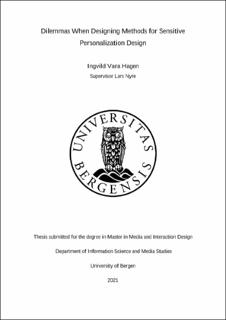Dilemmas When Designing Methods for Sensitive Personalization Design
Master thesis
Permanent lenke
https://hdl.handle.net/11250/2760961Utgivelsesdato
2021-06-01Metadata
Vis full innførselSamlinger
- Master theses [247]
Sammendrag
The objective of personalization technology is to create a product that matches the exact requirements of individual consumers. Most approaches for developing and testing such systems relies on sophisticated and advanced technology, and time. This leads to the impression that there exist few examples of personalization devices being developed and tested through the use of non-functional prototypes. However, there are some clear benefits to this type of prototyping. It simulates a potential real and future product, provides feedback from client and end-users, validates the concept, makes for early discovery of design problems, all while being a time- and cost-effective process. In addition, there seems to be a lack of consensus among researchers and bigger companies on how to best design personalization strategies in regard to users. This in spite of personalization becoming more and more prominent in everyday life. There needs to be an emphasis on making sure that users trust personalization systems in order to continue to use them. Non-functional prototyping can make for an efficient way of understanding how individuals interact with personalization systems with respect to the extension of trust, and how those extensions can be addressed by design. This master thesis presents an exploratory method for developing and testing sensitive personalization design by integrating previously distinct methods to create a trustworthy, time- and resource-efficient design process. The study is a collaboration between the University of Bergen and TV 2 and is based on one of TV 2s own news applications. The task was to explore how to best introduce personalization to the application in question. As part of the effort, the group realized that there could be a general method. The method utilizes a classic design scientific approach to develop and test three non-functional prototypes, each representing a specific personalization system. To simulate the effect of personalization on testers, each prototype has been constructed to match the design of a persona – a fictitious, hypothetical individual belonging to the target group. Participants have had to familiarize themselves with a given persona’s interests and preferences, and then role play through the classic design science user test. The method has contributed to the design of three plausible but hypothetical varieties of sensitive personalization systems to choose from, all having been tested and evaluated with real-time users. All main findings from this collaboration are presented in a separate impact report.
Utgiver
The University of BergenOpphavsrett
Copyright the Author. All rights reservedBeslektede innførsler
Viser innførsler beslektet ved tittel, forfatter og emneord.
-
Confidence in oneself, confidence in others: Design implications for the design of gameful CSCW systems
Haukås, Nils Norman (Master thesis, 2014-04-05)Disentangling the intricacies of digitally supporting collaboration remains a challenge. It's a challenge which the field of Computer Supported Collaborative Work have been tackling for decades and where they've argued ... -
Co-Designing Womunity Exploring the Design Space of Guided Online Peer Support for Women Recovering from Gynecological Cancer
Fiskerstrand, Ingvild (Master thesis, 2019-06-18) -
Decreased survival of medial pivot designs compared with cruciate-retaining designs in TKA without patellar resurfacing.
Øhrn, Frank-David; Gøthesen, Øystein; Lygre, Stein Håkon Låstad; Peng, Yi; Lian, Øystein Bjerkestrand; Lewis, Peter L; Furnes, Ove; Röhrl, Stephan Maximillian (Journal article; Peer reviewed, 2020)Background The medial pivot TKA design was introduced in the 1990s. These are fixed-bearing, medial-conforming implants with virtually no translation in the medial part of the knee, in contrast to the flat lateral part ...
